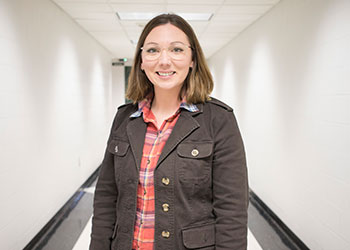WKU News
Does your service learning model impact students? Student and Faculty Research Different Approaches
- Aurelia Spaulding
- Tuesday, March 20th, 2018

“We are finding a dramatic difference in the impacts on students between the two types of service learning we are studying,” said WKU senior Alexa Hatcher. “Through critical SL, students are becoming empowered and feel that they are doing something that really matters in their community. They are also staying involved after class ends, none of which happens for the students who did a traditional SL project.”
Hatcher returned to WKU in fall 2014 to study Sociology with a minor in Citizenship and Social Justice and concentration in Community, Environment and Development. She takes courses at WKU campuses in Bowling Green and Glasgow, and she began research on service learning as part Dr. Nicole Breazeale’s Research Methods course in spring 2017. Her current research with Breazeale, “Critical Service Learning at WKU Glasgow Regional Campus: A Path for Marginalized Students to Stay in School and Combat Social Inequality?” investigates to what extent a traditional versus a critical model of SL impacts student outcomes such as psychological and political growth.
“I decided to continue to work on this research with Dr. Breazeale because my experience in critical service learning projects have been truly life changing, and I’m curious to know if and why it was life changing for other participants,” Hatcher said.
As Breazeale explained, "There is an important division in service-learning (SL) theory between traditional versus critical approaches—or what is often distinguished as ‘charity’ versus ‘change.’ A ‘charity’ approach offers immediate relief or assistance to a person or group while a ‘change’ approach empowers individuals to change the social structures that oppress them. We are investigating how social class mediates the experience of SL; in other words, it is likely that S-L feels very different for students who share a common social position—and potentially even a common social network— with those they are ‘serving.’ Thus, a critical model might be a better fit for these students--and indeed, that's what we are finding!"
Hatcher’s personal experience as a first-generation college student ties into her questioning the impact of service learning on student persistence in college and community impact.
“Like a large amount of students that studied sociology at WKU Glasgow, I too am older and poorer than the average student, work while taking classes, am from a rural area, and come from a family who never attended college (besides my mother who just finished an associate’s degree at a for-profit school while I have been in school), Hatcher said.
“I honestly didn’t think I would make it very far in college after having already quit once. It is almost surreal that I am graduating this semester. I believe that if it were not for participating in critical SL projects and this research project I would not be graduating, nor would I be as actively involved with politics and community organizing.”
Hatcher acknowledges the impact service learning has had on her life.
“It was this particular model of service learning that made me recognize my potential for success, helped me develop skills I needed to see myself as a professional, and gave me a reason to get a degree—to use the resources I have gained as a college graduate to push forward with social change in my community.”
Alexa Hatcher is a spring 2018 recipient of WKU’s Faculty-Undergraduate Student Engagement (FUSE) grant.
Some of the links on this page may require additional software to view.

